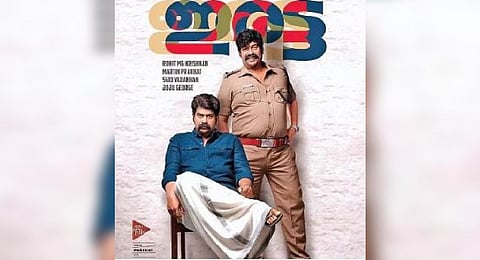

I measure the quality of an actor by the degree of intensity with which his performance lingers in my mind for a long time. Any actor who does that earns a lot of brownie points in my book. While growing up in the 90s, the two actors who predominantly did that for me were Mammootty (Sukrutham, Thaniyavarthanam) and Mohanlal (Aham, Sadayam). Who does the same for me today in contemporary Malayalam cinema? I can unblinkingly utter ‘Joju George,’ who can be relied upon to produce many a soul-shattering performance. After Nayattu, here comes Iratta, which brings back some of the names instrumental in realising the former, along with one fresh talent, director Rohit MG Krishnan.
Some films start slow but get more gripping along the way. Iratta gets its hooks deep in us even before the opening credits and never fails to sustain that momentum through its entirety. Who would’ve thought a simple sequence of two boys playing cricket around the premises of a police station would cause a considerable amount of tension and culminate in a jolt-inducing incident—one that would cause tremendous pain to an already-tormented police officer? The demise of someone close to DYSP Pramod (Joju George) plunges him into a whirlpool of morbid emotions and upsetting flashbacks that involve his twin, also a cop, Vinod (Joju George again).
Iratta does two things effectively: 1) keeping us guessing through a Rashomon-style procedural examining the testimonies of multiple suspects, and 2) exploring the backgrounds and personalities of Pramod and Vinod in the hope of finding a crucial clue that could solve the above case. It’s at once a compelling mystery and character study.
Joju plays Pramod and Vinod as two diametrically opposite characters. Pramod is the more restrained of the two, a gentleman who once wasn’t; Vinod is the slightly unhinged version, bearing certain distasteful qualities. How to tell them apart? The latter has a generally shabby disposition, a different eye colour, and tends to creep anyone out, regardless of gender, whenever he enters the room. What’s most impressive about Joju’s performance is that, despite having played conflicted, brooding khaki-clad men earlier—Joseph and Nayattu being the prime examples—both Pramod and Vinod have nothing in common with those characters. The actor imbues the twins with many little nuances and mannerisms that it’s not difficult to tell who is who.
Pramod and Vinod have had a fallout, but one thing they have in common is an unpleasant history with women. The world of Iratta is unkind to them—wives, daughters, partners... none of them has it easy, and the men are responsible. A man who rescues a woman from the oppressive and violent clutches of her ex-husband throws her into a different kind of hell, one of his own making. Another man repents, more than a decade later, for treating his wife poorly, with whom he hopes to reconnect, along with the daughter whom he never got to meet. There is a third situation—the most disturbing of all—which becomes inextricably linked to the fates of the two brothers.
There is a reason for these two characters to be twins. This writing choice makes so much sense once we get to the devastating final moments, before which you might wonder what would’ve happened had they been played by two different actors. I don’t know if it’s true, but I recall someone recently telling me that Pramod and Vinod were roles initially envisioned with two non-twin actors; however, later, Joju decided to play them both owing to the immense scope for performance, which the material of this nature affords. I assume this must have caused Rohit, who directed from his own script, to make an appropriate revision. It’s a clever choice because it sets up a hard-hitting finale that, in my book, trumps the one in Nayattu. As for the pivotal, plot-twisting bits of violence, Iratta believes in the ‘less is more’ adage and brings forth complex psychological implications that got me thinking of what K.G. George or Padmarajan once used to do.
Jakes Bejoy’s non-intrusive, relentlessly chill-inducing score is weaved seamlessly into the narrative. Manu Antony’s cuts produce maximum impact. Working in tandem are cinematographer Vijay’s atmosphere-heavy and menace-conjuring visuals. The film shares its overall aesthetic with Nayattu; if you liked how Nayattu looked and sounded, and if it’s the sort of filmmaking that gives you a high, there is a strong possibility that you might dig Iratta too.
Film: Iratta
Director: Rohit MG Krishnan
Cast: Joju George, Anjali, Abhiram Radhakrishnan, Sabumon Abdusamad, Arya Salim, Srindaa
Rating: 4/5